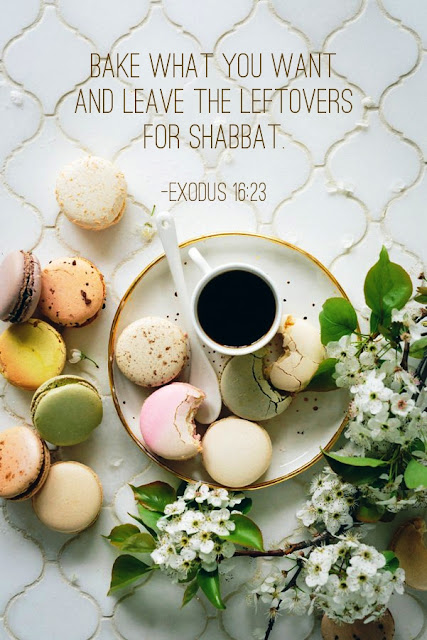This verse has really inspired me to stop cooking on Shabbat. Even those of us who enjoy kitchen work need a break so that we can rest and enjoy YHWH's set apart day. This is a clear instruction that we should plan to have food leftover that we can eat on Shabbat.
I've put together a few recipes that you can make ahead of time and then eat on the Sabbath. Many of them actually recommend making a day or two prior to let the flavors come together more. All of these recipes can be served cold or at room temperature. This isn't because I think it's wrong to reheat a casserole in the oven or run a slow cooker on Shabbat (though some believe it is). With the warmer days at this time of year the cool food is welcome, at least for me! Plus your kitchen doesn't need to be heated up.
These meals start with fresh veggies, beans, quick cooking grains like lentils and quinoa, and pasta so they come together quickly - perfect for hectic Fridays! You can save yourself even more time by doubling the recipe and enjoying it for Friday (or Thursday) dinner and then again on Shabbat. The recipes are each pretty well rounded in my opinion so they really don't need any accompaniments, but if one dish dinners aren't your thing you could serve any of these with bread, sliced cheese, salad greens with vinaigrette, and fresh or frozen fruit for dessert.
14 Make Ahead Meals for Shabbat:
Summer Green Bean Salad from Making Thyme for Health
This is great cold or at room temperature. In lieu of the chickpeas, I like to eat this with hummus.
Greek Lentil Salad from Cookie and Kate
Go ahead and dress the lentils and veggies the day before but leave out the spinach until just before serving so it doesn't wilt.
Farro Tabbouleh with Burrata and Hummus from Half Baked Harvest
If you don't have burrata this will still make for a filling meal served with pita bread and lots of fresh veggies.
Broccoli Tahini Pasta Salad from Love and Lemons
This salad stores really well for a few days in the fridge. Add a green at the last minute for even more veggies.
Quinoa Gado Gado Bowl from Minimalist Baker
You can steam the veggies in this or leave them raw. I would leave the quinoa, veggies, and dressing separate and then let everyone assemble their own combination on Shabbat.
Roasted Asparagus Wheat Berry Salad with Pesto from A Beautiful Plate
This recipe can be completely finished a few days before Shabbat. Just pull it out of the fridge when you're ready for lunch or dinner.
Sweet Potato Quinoa Salad from Well Plated
Sweet potatoes, black beans, and quinoa makes for a very filling salad. I like to set this out on the counter in the morning so it's at room temperature for lunch.
Everything But the Kitchen Sink Pasta Salad from Half Baked Harvest
Make this delicious pasta salad when your fridge is full of odds and ends that need used up. Tieghan says this salad is actually best made a few days ahead of time making it perfect for a Shabbat meal.
Chickpea Salad Stuffed Avocado from Making Thyme for Health
In lieu of stuffing avocados you could serve this salad in sandwich form.
Roasted Beet Lentil Salad from Oh My Veggies
I would combine all the ingredients the day before eating. Lentils and beets are a great combination. A little goat cheese in here would be good too.
California Chicken, Avocado, and Goat Cheese Salad from Half Baked Harvest
Prepare your ingredients ahead of time but don't combine them until you're ready to eat to keep your lettuce nice and crisp.
Black Bean Sweet Potato Salad with Jalapeno Lime Vinaigrette from Vanilla and Bean
Mix everything including that tasty vinaigrette the day before then add the spinach at meal time.
How fresh do these look? Use any type of grain to go with whatever fruit is in season, veggies, greens, a sprinkle of nuts or seeds, and cheese if you like.
Grilled Corn and Zucchini Salad with Sundried Tomato Vinaigrette from Minimalist Baker
This salad is one of my favorites! When I have fresh tomatoes I roast them and use instead of the sundried tomatoes and water. So good!
Want more recipes?
Get familiar with what Scripture says about what we should eat.
Here are slow cooker meal ideas you can make for the Sabbath. Plus, more here.
Summer salads more your pace? Here are more great ones!
Here are casseroles to make ahead for breakfast, lunch, dinner, or dessert.
And make your life easier with the No Stress Guide to Sabbath Day Meal Prep!
Get familiar with what Scripture says about what we should eat.
Here are slow cooker meal ideas you can make for the Sabbath. Plus, more here.
Summer salads more your pace? Here are more great ones!
Here are casseroles to make ahead for breakfast, lunch, dinner, or dessert.
And make your life easier with the No Stress Guide to Sabbath Day Meal Prep!

























.JPG)

